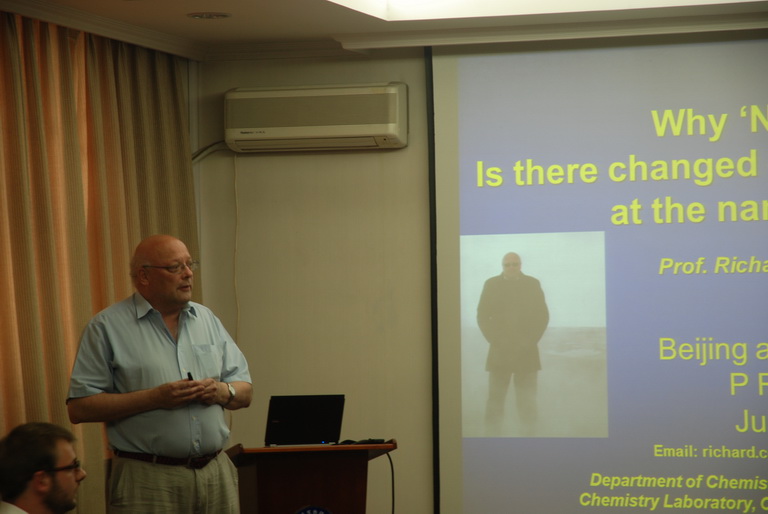光电化学系列学术报告(三十六) 2011-7-30
光电化学系列学术报告(三十六)

题目: Why ‘Nano’? Is There Changed Electrochemistry at the Nanoscale?
时间: 2011年07月30日 下午 14:30
地点: 中科院物理所BII 404
报告人: Prof Richard G.Compton Department of Chemistry,University of Oxford South Parks Road, OX1 3QZ, UK
报告摘要: Nanoparticles and nanomaterials are widely employed in electroanalytical sensors, particularly in amperometric devices, with significant improvements in performance often claimed, if not demonstrated. This lecture will present a critical overview seeking to identify where authentic changed behaviour exists between the macro- and micro-scale on the one hand and the nano-scale on the other. The following areas may be addressed. 1) Adsorption on nanoparticles and nanotubes; 2) The use of carbon nanotubes (CNTs) as electrode modifiers and the roles of (i) impurities in the CNTs arising from their manufacture via CVD, and (ii) the role of the CNTs in changing the mass transport regime to the electrode by virtue of altering a flat surface to a nanoporous one; 3) The role of nanomaterial porosity in general; 4)The investigation of electrode kinetics at nanoparticulate materials where the heterogeneity of the surface must be considered for correct mechanisms and kinetics to be inferred; 5) The modelling of transport to nano-sized electrodes where the diffusion and diffuse layers are of comparable size.
报告人简介: Richard Guy COMPTON is a Professor of Chemistry, Oxford University. He is Founding Editor and Editor-in-Chief of the electronic journal Electrochemistry Communications launched by Elsevier in January 1999. Physical Chemistry editor of the Oxford Chemistry Primers (Oxford University Press). His research interest are focused on electrochemistry, nanoelectrochemistry and chemical sensing: electrode reaction mechanisms, solid-liquid interfaces, spectroelectrochemistry, sonoelectrochemistry, electroanalysis, computer modelling of electrode processes, electrochemical sensing, gas sensing, et al. To date in excess of 1050 papers and review articles have been published (or are in press) in refereed journals along with four textbooks leading to an h-index of 62 (July 2011). Total citations > 21,000. The prizes and awards he obtained include 1999 Royal Society of Chemistry Medal in Electroanalytical Chemistry(The first and only recipient of both RSC medals in the area of electrochemistry/analysis.). 2004 Alexandro Volta Medal of the European Section of The Electrochemical Society, 2006 Breyer Medalist of the Royal Australian Chemical Institute, 2010 Elected Fellow of the International Society of Electrochemistry, 2011 Sir George Stokes Award of the Royal Society of Chemistry, et al.
